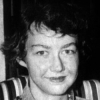Flannery O'Connor

Flannery O'Connor
Mary Flannery O'Connorwas an American writer and essayist. An important voice in American literature, she wrote two novels and 32 short stories, as well as a number of reviews and commentaries. She was a Southern writer who often wrote in a Southern Gothic style and relied heavily on regional settings and grotesque characters. Her writing also reflected her own Roman Catholic faith and frequently examined questions of morality and ethics. Her posthumously-compiled Complete Stories won the 1972 U.S. National Book...
NationalityAmerican
ProfessionNovelist
Date of Birth25 March 1925
CitySavannah, GA
CountryUnited States of America
I am very much afraid that to the fiction writer the fact that we shall always have the poor with us is a source of satisfaction,for it means, essentially, that he will always be able to find someone like himself.
... the novelist is bound by the reasonable possibilities, not the probabilities, of his culture.
Where there is no belief in the soul, there is very little drama . . . . Either one is serious about salvation or one is not. And it is well to realize that the maximum amount of seriousness admits the maximum amount of comedy. Only if we are secure in our beliefs can we see the comical side of the universe.
Poorly written novels--no matter how pious and edifying the behavior of the characters--are not good in themselves and are therefore not really edifying.
... the man in the violent situation reveals those qualities least dispensable in his personality, those qualities which are all he will have to take into eternity with him.
Success means being heard and don't stand there and tell me that you are indifferent to being heard. You may write for the joy of it, but the act of writing is not complete in itself. It has to end in its audience.
It is hard to make your adversaries real people unless you recognize yourself in them - in which case, if you don't watch out, they cease to be adversaries.
You ought to be able to discover something from your stories. If you don't, probably nobody else will.
Policy and politics generally go contrary to principle.
If we forget our past, we won't remember our future and it will be as well because we won't have one.
The idea of being a writer attracts a good many shiftless people, those who are merely burdened with poetic feelings or afflicted with sensibility.
A story has to have muscle as well as meaning, and the meaning has to be in the muscle.
Elizabeth Hardwick told me once that all her first drafts sounded as if a chicken had written them. So do mine for the most part.
Dogma can in no way limit a limitless God.